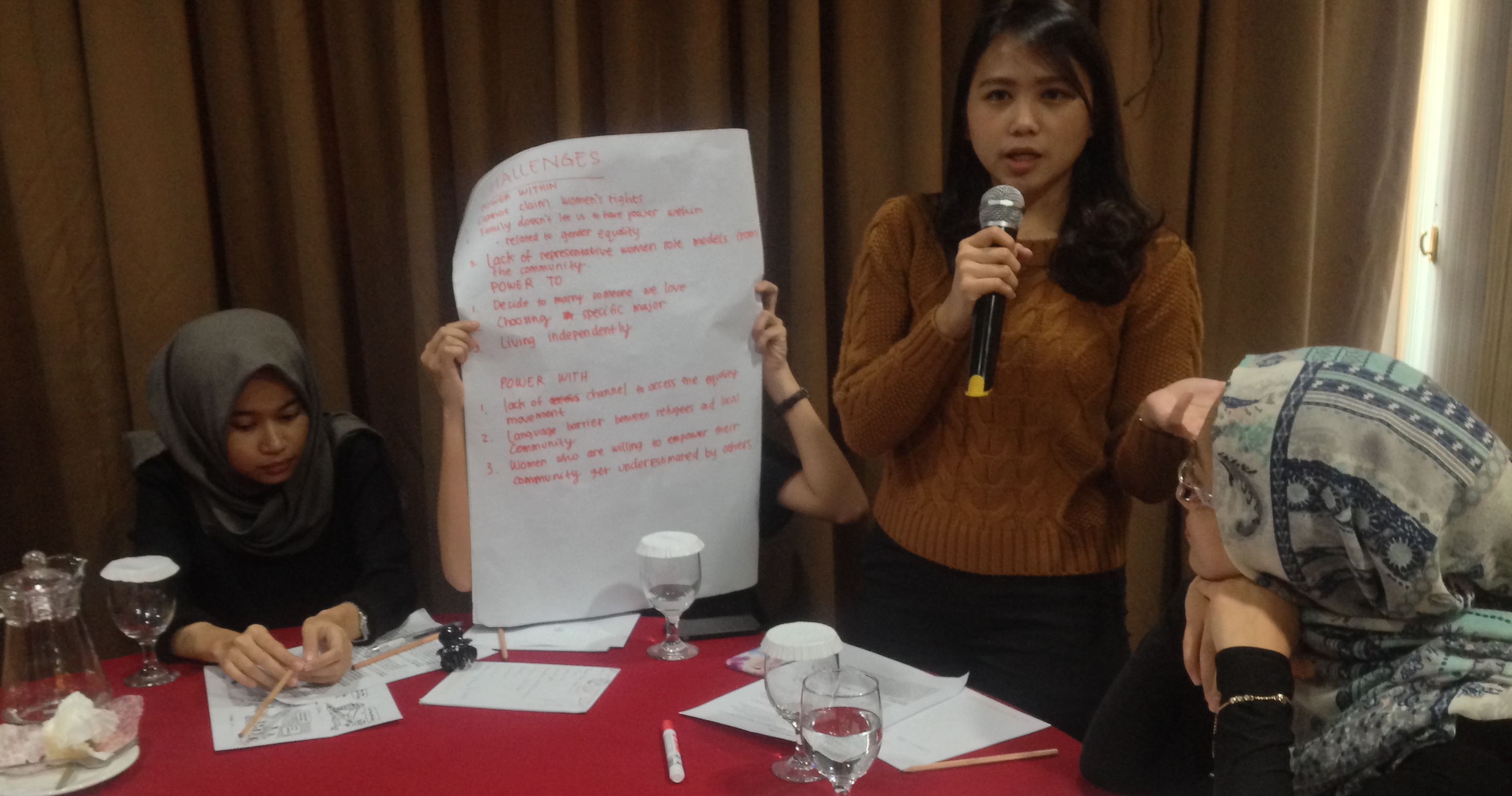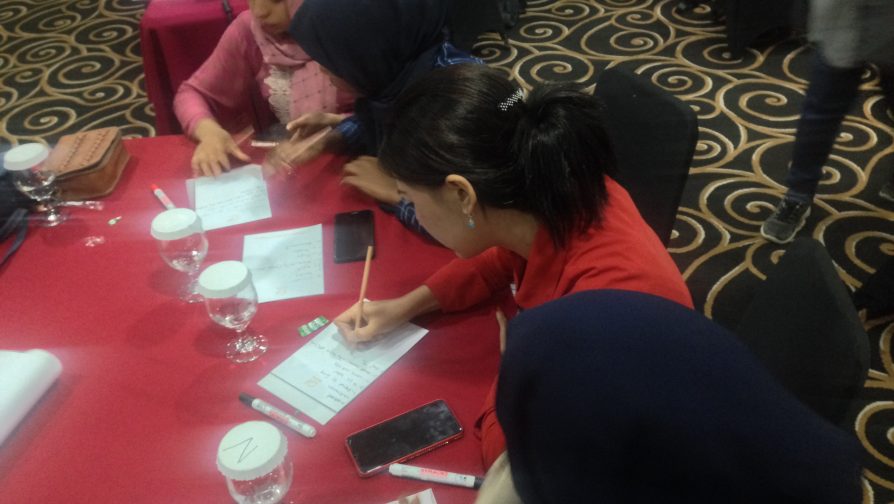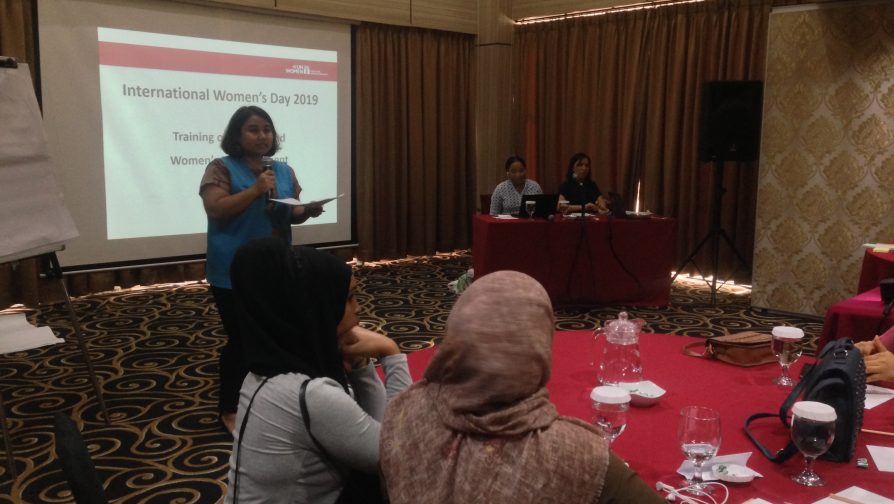International Women’s Day is globally celebrated on March 8 every year. It is a rallying point for strengthening the movement for women’s rights by recognizing not only the achievements of women but also launching new initiatives and activities for the advancement of gender equality.

Indonesian and refugee women share challenges and opportunities as women, demanding dignity and respect for women worldwide. ©UNHCR/T. Kurniasari
Shira*, a refugee from Afghanistan, is proud of being born as a woman. However, raised and surrounded by a conservative family and community, life has not been easy for an Afghan woman like her. “My parents don’t give me full freedom. I can’t just go out. I have to be at home. I can’t go somewhere if there are no female friends,” Shira said. “We always have to take permission from our parents and husbands, even everything we wear,” she went on.
Shira is not the only women facing such gender-based challenges in her country. Almira, a Somali refugee, said that women in her country are lacking access to education. “In a family, if you have two children – a boy and a girl – you will send the boy to school, not the girl,” Almira said.
Shira and Almira were two of dozens of women from various nationalities, including Indonesians, who spoke out in a training to commemorate the International Women’s Day (IWD) organized by UNHCR in Jakarta.
IWD is globally celebrated on March 8 every year. It is a rallying point for strengthening the movement for women’s rights by recognizing not only the achievements of women but also launching new initiatives and activities for the advancement of gender equality. It is also a time to reflect on progress made on gender parity and empowerment of women and girls, as well as to look forward to more opportunities for women and girls around the globe.
This training session was essential to empower refugee women to discuss gender-related issues, women’s rights, women’s roles in decision making that aim at building their skills and promoting resilience. Representatives from UNHCR’s partners and refugee learning centers also attended the event.
Agnes Gurning of UN Women led the session where women could share thoughts, ideas, stories and discuss challenges and opportunities. The main issues discussed included freedom of speech, education and employment.
“In the community, many parents don’t let women choose their partners. Parents choose partners for the girls instead. Women cannot say that they love someone or want to marry someone. But boys, they can do so,” said Nena, a Pakistani refugee.
Participants also shared their limitation in education and employment opportunities. “Women face difficulties to work. In some cases, some companies or organizations require that a woman shouldn’t get married yet to get the job. Only single women could get the job,” said Cheryl, an Indonesian participant. Other participants also highlighted inequality at work as there were times when women found difficulties to get to higher level, while men obtain more salary than women.

Refugee participants brainstorm on gender-related issues, sharing their personal stories. ©UNHCR/T. Kurniasari
All participants hoped to get more access to education for all women around the globe. “When you educate a girl, you educate a society. If you educate your girls, you can educate the whole world,” said Almira.
Despite all the challenges, training participants agreed that women needed to break the barrier and unleash their power. “We are the ones who create the opportunities. If people say that you can’t do it then you need to create opportunities for yourself to believe that you can do it,” said Raina, another Afghan refugee.
“We are here to support each other, to build each other’s power and strength, to help each other. We can learn from each other on how to build our future with our own goals, to write our own book and story. We do have the power to change and set the goals for our future,” she added.
Janet Pima, Protection Officer (Community Based) of UNHCR in her closing remarks, urged all the women in the room to take leadership roles in their day to day lives as much as possible. Janet highlighted that refugee women can be engaged in volunteer activities or take roles such as Refugee Representatives (RR) among their community so they can bring out the voice, ideas and concerns of refugee women and be heard.

AN UNHCR staff greets participants of the training session to commemorate International World Women’s Day. ©UNHCR/T. Kurniasari
Share on Facebook Share on Twitter